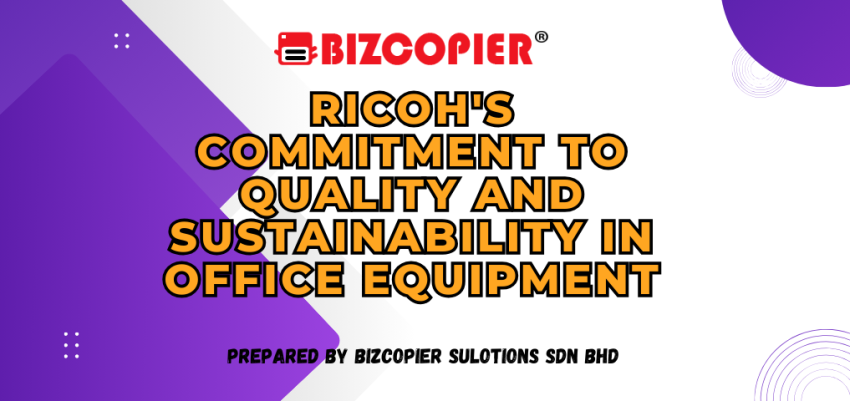In an era where environmental responsibility is crucial, Ricoh stands out as a leader in the office equipment industry, prioritizing both quality and sustainability. With over 80 years of experience, the company has built a reputation not only for its innovative printing and document management solutions but also for its dedication to reducing its environmental impact. This article delves into Ricoh’s commitment to quality and sustainability, highlighting the initiatives and technologies that make it a preferred choice for businesses.
1. Quality at the Core
Ricoh’s commitment to quality is evident in every aspect of its product line, from printers to multifunction devices. The company employs rigorous testing and quality assurance protocols to ensure that its machines deliver exceptional performance and reliability. Key elements include:
Advanced Technology: Ricoh integrates the latest printing technologies, ensuring sharp image quality and fast processing speeds. This commitment to innovation helps businesses produce professional-grade documents with ease.
Durability and Longevity: Ricoh devices are designed for longevity, which means fewer replacements and repairs over time. This durability not only enhances user experience but also contributes to waste reduction.
User-Centric Design: Many Ricoh machines feature intuitive interfaces that simplify operation and reduce the learning curve for employees. User-friendly design enhances productivity and minimizes errors.
2. Sustainability Initiatives
Ricoh’s commitment to sustainability is deeply embedded in its business practices. The company focuses on several key areas to minimize its environmental impact:
Eco-Friendly Manufacturing: Ricoh employs sustainable manufacturing practices, including energy-efficient production processes and the use of recycled materials. This approach reduces waste and conserves resources throughout the product lifecycle.
Energy Efficiency: Many Ricoh devices are ENERGY STAR® certified, ensuring they meet stringent energy efficiency guidelines. These machines consume less energy, resulting in lower operational costs for businesses and reduced carbon footprints.
Recycling Programs: Ricoh actively promotes recycling and offers programs for returning used cartridges and devices. The company’s closed-loop recycling system minimizes waste and supports a circular economy.
Sustainable Supply Chain: Ricoh collaborates with suppliers who share its commitment to sustainability. This ensures that the materials and components used in Ricoh products meet environmental standards.
3. Environmental Certifications and Standards
Ricoh is recognized globally for its commitment to sustainability, holding several environmental certifications:
ISO 14001 Certification: This international standard for environmental management systems demonstrates Ricoh’s commitment to minimizing its environmental impact through effective resource management.
EcoLabel Certifications: Ricoh products often carry eco-label certifications, indicating that they meet high environmental standards. This helps businesses make informed purchasing decisions that align with their sustainability goals.
4. Corporate Social Responsibility (CSR)
Ricoh’s sustainability efforts extend beyond its products and manufacturing processes. The company embraces corporate social responsibility, engaging in community initiatives and promoting environmental awareness. Key aspects of its CSR strategy include:
Community Engagement: Ricoh participates in local and global initiatives aimed at promoting sustainability and environmental stewardship. These efforts include educational programs, tree planting, and waste reduction campaigns.
Employee Involvement: Ricoh encourages employees to participate in sustainability initiatives, fostering a culture of responsibility and innovation within the organization.
Sustainability Reporting: Ricoh regularly publishes sustainability reports, detailing its progress and commitments. This transparency helps build trust with stakeholders and informs the public about the company’s environmental performance.
5. The Business Case for Sustainability
Investing in Ricoh’s quality and sustainable office equipment offers businesses significant advantages:
Cost Savings: Energy-efficient machines reduce utility costs, while durable devices minimize the need for replacements and repairs.
Enhanced Brand Image: Partnering with a company that prioritizes sustainability can enhance a business’s reputation and appeal to environmentally conscious customers.
Regulatory Compliance: As governments increasingly implement environmental regulations, using sustainable equipment helps businesses remain compliant and avoid potential penalties.
6. Conclusion
Ricoh’s commitment to quality and sustainability sets it apart in the office equipment industry. By combining innovative technology with eco-friendly practices, Ricoh not only meets the demands of today’s businesses but also contributes positively to the environment. As companies seek to enhance their operational efficiency and environmental responsibility, choosing Ricoh’s products represents a step towards a more sustainable future. Through its ongoing dedication to quality and sustainability, Ricoh continues to lead the charge in making office equipment that benefits both businesses and the planet.

